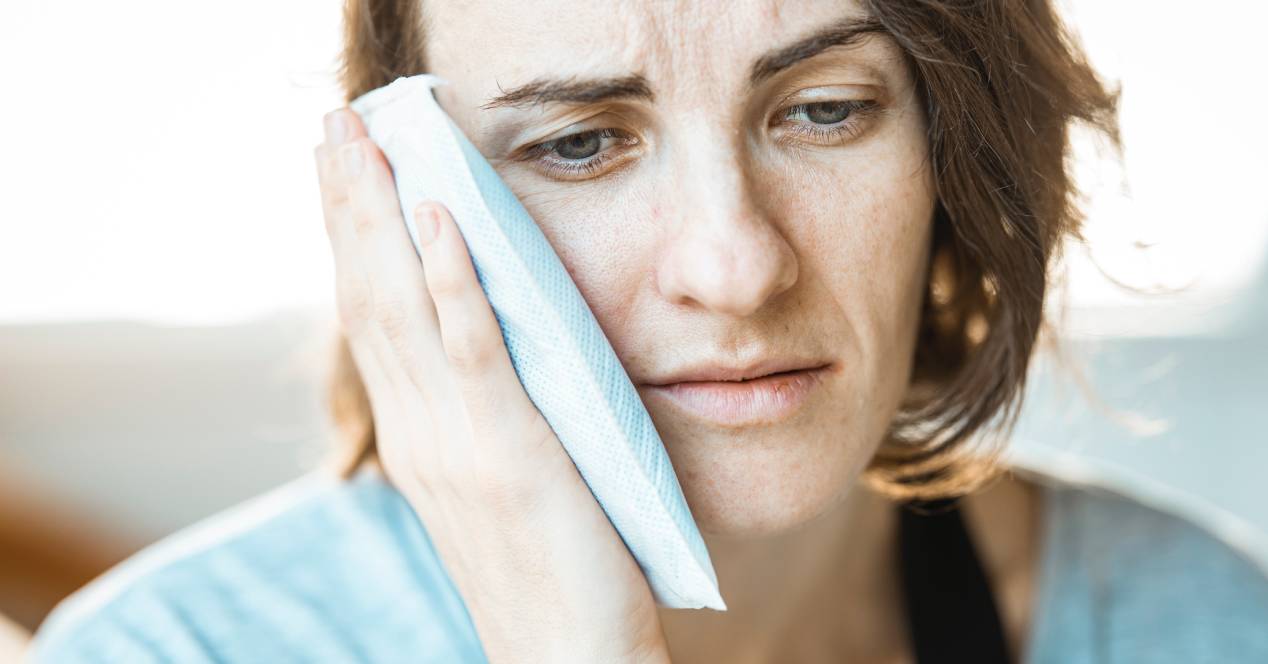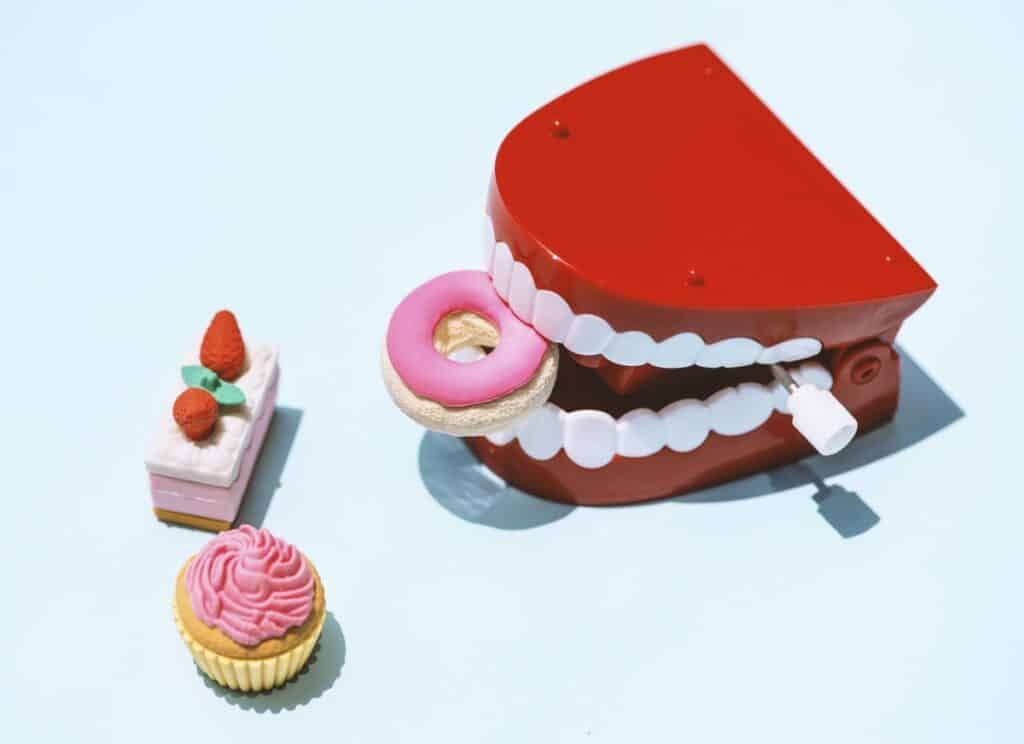
Morning jaw pain is no joke. Many people wake up with a sore mouth, loaded or even with muscle tension. Find out why we may wake up with jaw pain and what we can do to control or lessen the discomfort.
Although we may experience occasional jaw pain from sleeping in an awkward position, chronic jaw pain in the morning can be a sign of something more serious.
Causes
To find out how to relieve jaw pain when you wake up, it is convenient to know the origin and the problem that generates it.
Grinding your teeth
Grinding or clenching our teeth at night is one of the most common reasons our jaw hurts when we wake up. The bruxismCommonly known as teeth grinding or clenching, it can occur at night or during the day, but for most people, it's more of a nocturnal problem.
The problem is that this habit is totally unconscious, meaning you probably have no idea you're squeezing (until you experience pain). There are some people who are programmed to grind their teeth, which means they grind in their sleep, just as they would while tossing and turning.
However, the most common cause of teeth grinding is a bite problem. The brain wants the teeth, jaws, and all the muscles around the head and neck to be in a comfortable position, and if it senses something getting in the way of that position, it will move the jaw to try to avoid the interference.
sleeping in a bad position
Most of us are familiar with the notion that poor posture can cause pain (like back pain from sitting at a desk all day). But the same goes for the posture at pillow time.
Poor sleeping posture causes imbalances in the muscles that support the head and neck. And these muscles play a critical role in the positioning and function of the jaw. So when they get stressed (from being in a bad position), the result is usually pain.
training routine
We've all experienced sore muscles after an intense sweat session, but the daily exercise routine can also be the reason why we wake up with jaw pain. Weight lifting and high-impact exercises like running can put stress on the jaw. During an intense workout, some people have been known to clench their teeth, which as we know can put pressure on the jaw muscles.
Also, overzealous training can lead to a sore muscle or two, and sometimes this soreness causes us to compensate for our posture to protect sore muscles.
Sleep Apnea
Morning jaw pain could be caused by sleep apnea, a sleep disorder characterized by abnormal breathing during sleep. Many people who suffer from sleep apnea also complain of chronic jaw pain. That's because, in addition to factors like weight, jaw position can also contribute to this sleep-related problem.
There has been a lot of evidence connecting sleep apnea, nocturnal bruxism, and chronic jaw pain. Some studies have suggested that the brain's desire to keep you breathing at all costs explains the nightly clenching/grinding that leads to chronic jaw pain.
That is, the brain will fight to keep the airways open by forcing the jaw muscles to grind (essentially moving the jaw to a position where breathing is not obstructed).
Dinner food or drink
Some foods and drinks can stress the overall system and contribute to jaw pain, especially if consumed just before bed.
For example, foods that contain stimulants, such as caffeine, can wake up the brain and amplify stress, which can increase nighttime grinding or clenching of teeth. And the harder we clench at night, the more likely we are to develop jaw discomfort the next morning.
Alcohol and other depressants can also cause jaw muscle problems. This is especially the case when it comes to sleep apnea-induced jaw pain.
That's because alcohol relaxes the muscles in the back of your throat, which can disrupt your breathing. And as we know, the brain will help ensure that we keep breathing by grinding our teeth, causing tension and pain in the jaw muscles.
jaw disorder
Morning jaw pain is often a telltale sign of a temporomandibular joint disorder. It has been estimated that 1 in 12 people suffer from some type of disorder, a broad term referring to a multitude of signs and symptoms, often attributed to chronic head, neck and jaw pain.
Many times, this disorder is associated with a malposition of the jaw. In fact, things like incorrect posture, missing teeth, misplaced teeth, or a misaligned bite can all contribute to temporomandibular joint problems. Stress can also aggravate these contributing factors.
Tooth decay or gum disease
Tooth decay usually first develops in the outer layers of a tooth. If left untreated, decay can spread to the inner layers of a tooth and to the root and surrounding bone. The result: a throbbing jaw.
Periodontitis, or gum disease, can also be a cause. Periodontitis usually begins as inflammation in the gums from a buildup of bacteria, as well as a buildup of plaque on the teeth. Without treatment, it can reach the bones and other tissues and cause significant pain.

Transmission
Once the cause of the pain is known, we can prevent or treat it with the following tips:
- Sleep Apnea: If we suspect that sleep apnea is the source of morning jaw pain, we will consult a sleep doctor who can properly evaluate and diagnose it. For those who suffer from this sleep disorder, there are solutions that can help us breathe through the night. Among them is a dental appliance that helps keep the lower jaw forward and the airway open.
- Diet: A simple solution to these problems is to avoid these foods and drinks before bed. That means cutting back on caffeine and cocktails several hours before bed, which is a smart strategy for getting overall quality sleep.
- Training: If we clench our teeth during exercise, we will consult a dentist to make a custom mouth guard for us. And although we can also buy a mouth guard at the local pharmacy, it may not be as effective. You have to be careful with those 'boil and bite' mouth guards. Sometimes they can put the jaw in a position that actually hurts more than it helps.
- sleeping in a bad position: While there is no perfect sleeping position that will prevent jaw pain, proper head and neck support is critical to getting a good night's sleep and reducing the chance of sore muscles. That is, invest in a support pillow. A good pillow is especially important when you sleep on your side, because sleeping on your side can stress your neck muscles if your head isn't well supported.
- Bruxism: Although it is almost impossible to stop something we do involuntarily, there are strategies to protect the mouth from pain. Sometimes simple night guards can be used to protect the teeth. However, if the bite position problem is more severe and you have very severe or long-lasting pain, your dentist may require further evaluation. The dentist can make an appliance that helps us put the jaw in a better position to relieve tension on the teeth and muscles. Also, keeping your stress level under control is also important, as stress can make bruxism worse.
- jaw disorder: If we believe your jaw pain is related to a disorder, see a specialist for a detailed analysis of the bite, teeth, and surrounding muscles. Treatment can range from a simple mouth guard and/or stress management to more complicated therapy with jaw positioning orthoses or pharmaceutical solutions.